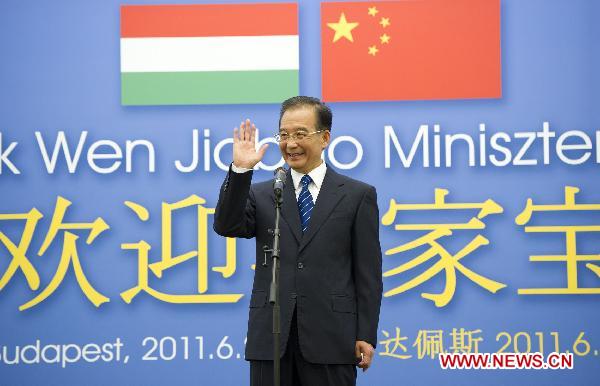Wen in Hungary for visit, stresses youths' role in bilateral ties
 0 Comment(s)
0 Comment(s) Print
Print E-mail
Xinhua, June 25, 2011
E-mail
Xinhua, June 25, 2011
 |
| Chinese Premier Wen Jiabao gestures while answering students' questions during a cultural exchange activity at the Eotvos Lorand University in Budapest, Hungary, June 24, 2011. [Xinhua] |
Wang Zhiming, deputy director general of the European Affairs Department of the Chinese Commerce Ministry, told reporters that Wen and Cameron will witness the signing of deals covering inter-city cooperation, investment, resource exploration, bank cooperation, architecture and design.
The two countries will sign a joint statement on facilitating mutual investment, Wang said, adding that the visit may produce deals related to chemical engineering, electronics and clean energy.
China and Germany are also expected to launch a consultation mechanism for use by the governments of both countries during Wen's stay in Berlin, with a number of ministers attending the launching ceremony.
"The launch of the consultation mechanism will mean a lot for China-Germany relations and reflects the relatively high level of bilateral relations," Fu said.
Wen will meet with German leaders and attend the 6th China-Germany Economic and Technological Cooperation Forum during his visit.
As Wen kicked off his visit to Europe Friday, the Financial Times published on the same day a commentary he wrote. In the aritcle, Wen said his government is confident that price rises in China will be firmly under control this year.
"There is concern as to whether China can rein in inflation and sustain its rapid development. My answer is an emphatic 'yes,'" Wen said in the article.
"The overall price level is within a controllable range and is expected to drop steadily. The output of grain, of which there is now an abundant supply, has increased for seven years in a row. There is an oversupply of main industrial products. Imports are growing fast," Wen said. "We are confident price rises will be firmly under control this year."
China is now at a new starting point in its drive for development, Wen said. He noted that China will continue to pursue economic structural adjustment, boost research and development, and education, save energy and resources, promote ecological and environmental conservation, and narrow the regional and urban-rural gap.
The world should welcome the fast development of emerging economies, respect different models of development, increase help to least developed countries, and promote strong, sustainable and balanced growth of the global economy, Wen added.





